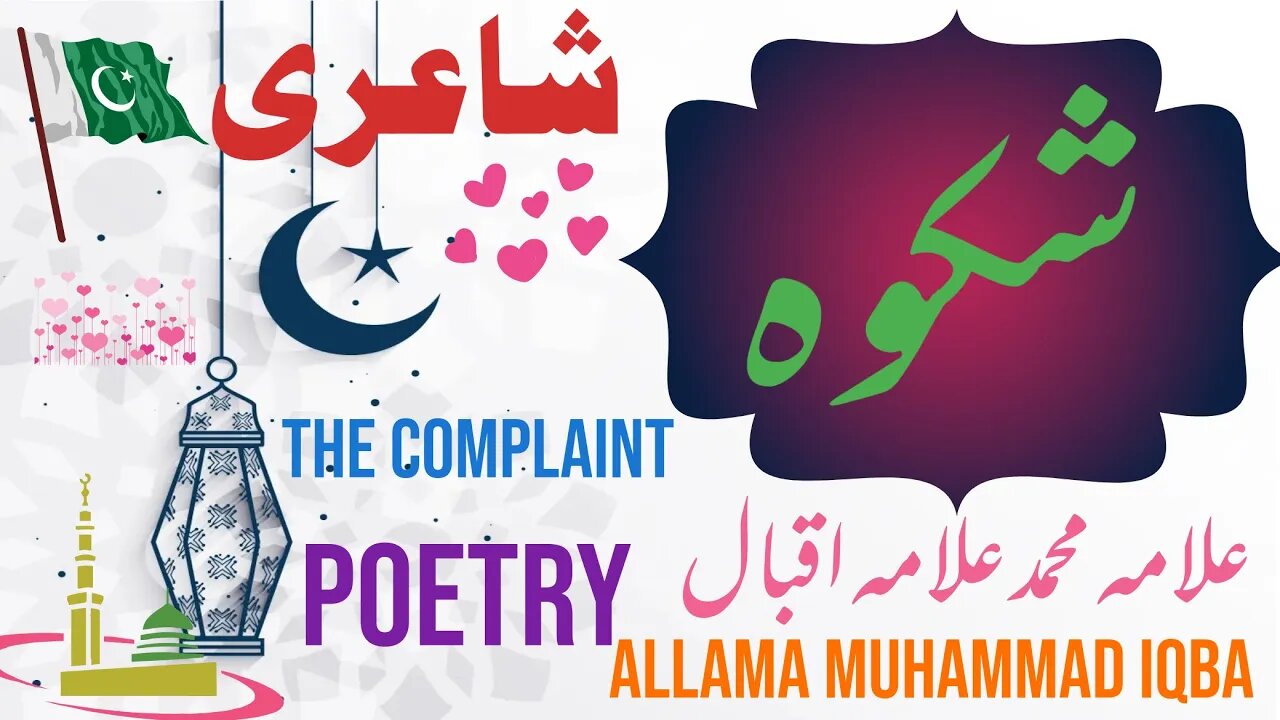Premium Only Content

Shikwa | The Complaint Allama iqbal | Bang-e-dra: 105 | Best Urdu Poetry | kalam-e-iqbal | Iqbaliyat
Shikwa The Complaint Allama Muhammad Iqbal علامہ محمد اقبال#shikwaallamaiqbal #allamaiqbal
Born and raised in Sialkot, Punjab in an ethnic Kashmiri Muslim family, Iqbal completed his B.A. and M.A. at the Government College Lahore. He instructed Arabic at the Oriental College, Lahore from 1899 until 1903. Amid this time, he composed productively. Among the Urdu sonnets from this time that stay prevalent are Parinde ki faryad (A bird's supplication), an early contemplation on creature rights, and Tarana-e-Hindi (The Tune of India) a enthusiastic poem—both lyrics composed for children. In 1905, he cleared out for assist considers in Europe, to begin with to Britain, where he completed a moment B.A. at Trinity College, Cambridge and was hence called to the bar at Lincoln's Motel, and after that to Germany,"Shikwa" (Urdu: شکوہ, "Complaint") and "Jawab-e-Shikwa" (Urdu: جواب شکوہ, "Reaction to the Complaint") are sonnets composed by Muhammad Iqbal, within the Urdu dialect, which were afterward distributed in his book Kulliat-e-Iqbal. The lyrics are regularly famous for their musicality, poetical magnificence and profundity of thought.
In spite of the fact that much of his verse is composed in Persian, Muhammad Iqbal was too a artist of stature in Urdu. Shikwa, distributed in 1909, and Jawab-e-Shikwa, distributed in 1913, laud the bequest of Islam and its civilizing part in history, wail over the destiny of Muslims all over, and decisively go up against the problems of Islam in present day times. Shikwa is within the frame of a complaint to Allah for having let down Muslims and Jawab-e-Shikwa is within the frame of God's reply. The central idea of the lyric Shikwa is that God isn't satisfying his guarantee to ensure adherents of the Prophet from misfortune and a decay in fortune. In Jawab-e Shikwa God answers straightforwardly that he has not broken his guarantee; instep it is the Muslims, his devotees, who have turned absent from the Way.
The reason why Shikwa raised contentions is that the most topic of the sonnet was the 'Complaint to God' for Muslim's destruction, ill-treatment and inconveniences they were confronting. When the primary of these lyrics, Shikwa, was distributed it made disarray among Muslim Researchers who thought that Iqbal was being thankless for the favors of God. "When Iqbal composed Shikwa, conventional devout clerics called him an infidel, and in all trustworthiness, Shikwa does radiate an awfully solid sense of entitlement". The moment sonnet, Jawab-e-Shikwa, was not declared with the distribution of the primary, but when it was distributed four a long time afterward Iqbal was lauded for his commitment to Urdu verse and Islamic writing.
Sir Muhammad Iqbal Kt , was a South Asian Muslim author, rationalist, and lawmaker, whose verse within the Urdu dialect is considered among the most noteworthy of the twentieth century, and whose vision of a social and political perfect for the Muslims of British-ruled India was to invigorate the drive for Pakistan. He is commonly alluded to by the honorific Allama] (from Persian: علامہ, romanized: ʿallāma, lit. 'very knowing, most learned').
Born and raised in Sialkot, Punjab in an ethnic Kashmiri Muslim family, Iqbal completed his B.A. and M.A. at the Government College Lahore. He instructed Arabic at the Oriental College, Lahore from 1899 until 1903. Amid this time, he composed productively. Among the Urdu sonnets from this time that stay prevalent are Parinde ki faryad (A bird's supplication), an early contemplation on creature rights, and Tarana-e-Hindi (The Tune of India) a enthusiastic poem—both lyrics composed for children. In 1905, he cleared out for assist considers in Europe, to begin with to Britain, where he completed a moment B.A. at Trinity College, Cambridge and was hence called to the bar at Lincoln's Motel, and after that to Germany, where he gotten a Ph.D. in logic at the College of Munich. After returning to Lahore in 1908, he built up a law hone but concentrated on composing academic works on legislative issues, financial matters, history, logic, and religion. He is best known for his wonderful works, counting Asrar-e-Khudi – after whose distribution he was granted a knighthood, Rumuz-e-Bekhudi, and the Bang-e-Dara. In Iran, where he is known as Iqbāl-e Lāhorī (Iqbal of Lahore), he is exceedingly respected for his Persian works.
Iqbal was a solid defender of the political and otherworldly restoration of Islamic civilisation over the world, but in specific in South Asia; a arrangement of addresses he conveyed to this impact were distributed as The Recreation of Devout Thought in Islam. Iqbal was chosen to the Punjab Administrative Committee in 1927 and held a number of positions within the All India Muslim Alliance. In his 1930 presidential address at the League's yearly assembly in Allahabad, he defined a political system for Muslims in British-ruled India. Iqbal passed on in 1938.
#shikwa #shikwaallamaiqbal #tabligh
-
 LIVE
LIVE
VINCE
1 hour agoOBAMA: Is It Treason Then? | Episode 91 - 07/23/25
35,247 watching -
 LIVE
LIVE
Law&Crime
1 hour agoLIVE: Bryan Kohberger Sentencing — ID v. Bryan Kohberger
937 watching -

Dear America
2 hours agoTRUMP Reveals MASSIVE Evidence Against OBAMA!! “ He’s The Ringleader” + Maxwell Subpoena APPROVED!!
19.7K59 -
 LIVE
LIVE
Badlands Media
1 hour agoBadlands Daily: July 23, 2025
2,705 watching -
 LIVE
LIVE
Matt Kohrs
9 hours agoStocks Push To Record High on New Trade Deals || Live Trading
789 watching -
 LIVE
LIVE
Wendy Bell Radio
5 hours agoGrasping At Straws
9,800 watching -
 LIVE
LIVE
Randi Hipper
27 minutes agoLOCAL BITCOIN BOTTOM IS IN? Technical Analysis with Cassius Cuvee
78 watching -
 45:02
45:02
The Finance Hub
8 hours ago $0.07 earnedI CAN'T BELIEVE WHAT JUST HAPPENED TO HILLARY CLINTON!
1292 -
 1:36:33
1:36:33
Chicks On The Right
4 hours agoOzzy gone, Portnoy vs Schultz, more on Colbert show ending, and Candace's likely new guest
8.73K1 -
 LIVE
LIVE
LFA TV
12 hours agoLFA TV ALL DAY STREAM - WEDNESDAY 7/23/25
4,762 watching